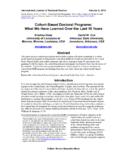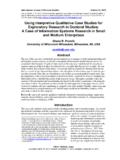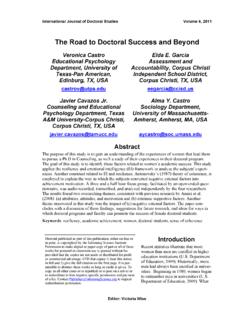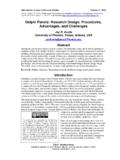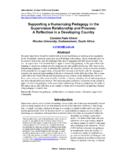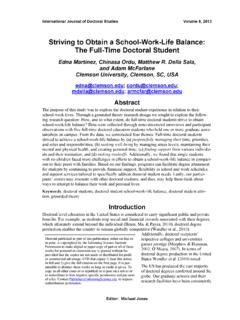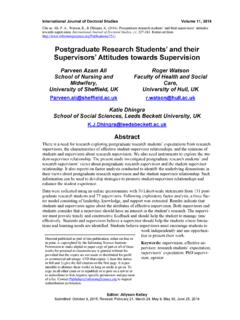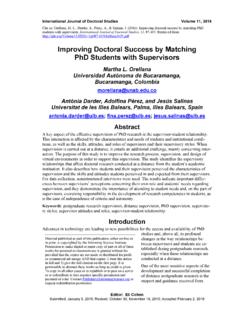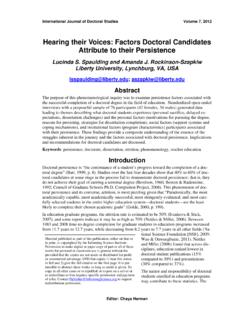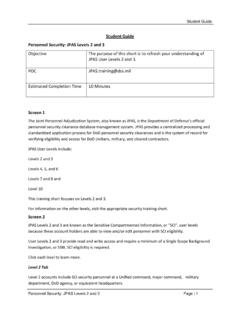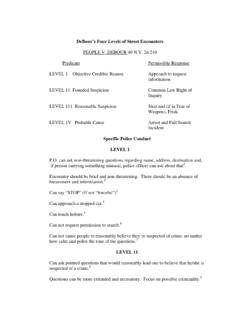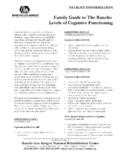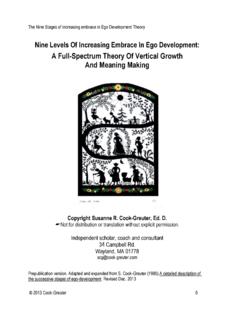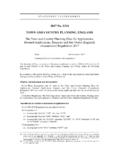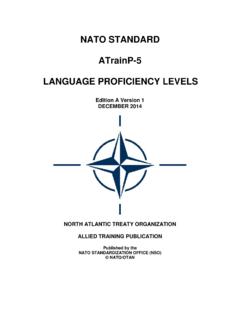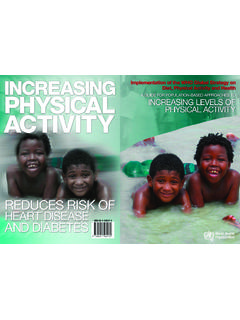Transcription of Navigating the Doctoral Experience: The Role of …
1 International Journal of Doctoral Studies Volume 7, 2012 Navigating the Doctoral experience : The Role of Social Support in Successful Degree Completion Dharmananda Jairam and David H. Kahl, Jr. Penn State University - Erie, Erie, PA, USA Abstract This study investigated the role of social support in the successful completion of a Doctoral de-gree. Thirty-one participants with earned Doctoral degrees completed an open-ended qualitative survey. The researchers asked the participants to describe the behaviors from their social support network that both helped and hindered their degree completion.
2 The findings lend support for the stress-buffer hypothesis and show that all three sources of social support ( , academic friends, family, and faculty) provide positive and negative support. The findings suggested the following recommendations for future Doctoral students: a) aligning themselves with a small group of aca-demic friends and preparing for the inevitable peer competition, b) seeking assistance from family members on certain tasks and educating family members on the Doctoral student experience , and c) establishing good rapport with a Doctoral adviser who is professionally active.
3 Results also suggest recommendations for Doctoral advisers, including awareness of how negative communi-cation among faculty impacts Doctoral students and the need to stay professionally active and maintain professional connections. Finally, limitations to this study and directions for future re-search are discussed. Keywords: Doctoral education, Doctoral experience , social support, stress-buffer hypothesis Introduction The Doctoral degree is considered the pinnacle of education, and it is pursued by nearly 100,000 students in the (Carnegie Classification, ).
4 Doctoral students are among the best and brightest students, having championed the highly competitive selection process (Ali & Kohun, 2006; Gilliam & Kitronis, 2006). However, 50% of Doctoral students will not finish their degree (Walker, Golde, Jones, Bueschel, & Hutchings, 2008), and 40,000 drop out every year (Ali & Kohun, 2007). In fact, many leave their programs in the first year (Esping, 2010; Lovitts, 2001). Doctoral student attrition is a silent epidemic in the (Ali & Kohun, 2007; Lovitts, 2001). Through empirical investigation, researchers have found that Doctoral student attrition is linked to two main factors, stress (Lovitts, 2001) and feelings of social isolation (Ali & Kohun, 2006; Hawlery, 2003; Lewis, Ginsberg, Da-vies, & Smith, 2004).
5 First, with regard to stress, Doctoral students typically ..face enormous demands upon their time, energy, intelligence, endurance, patience, and organizational skills (Committee on the College Student, 2000, p. 1); all of which heighten their stress level. Greater stress is experi-enced when it involves multiple and persistent stressors, rather than a single Material published as part of this publication, either on-line or in print, is copyrighted by the Informing Science Institute. Permission to make digital or paper copy of part or all of these works for personal or classroom use is granted without fee provided that the copies are not made or distributed for profit or commercial advantage AND that copies 1) bear this notice in full and 2) give the full citation on the first page.
6 It is per-missible to abstract these works so long as credit is given. To copy in all other cases or to republish or to post on a server or to redistribute to lists requires specific permission and payment of a fee. Contact to request redistribution permission. Editor: Eli Cohen Social Support and Doctoral Education event (Cohen & Wills, 1985). Doctoral students are significantly more stressed than the general public, and they report that their stress is mainly attributed to their graduate programs (Cahir & Morris, 1991).
7 The stressors of Doctoral study include relative poverty, anxiety, sleeplessness, academic demands, fear of failure, examinations, and time constraints (Bowman & Bowman, 1990; Esping, 2010). Additionally, Doctoral students also find themselves having to manage the socialization into their new roles, building and maintaining new relationships, and creating their professional identity (Golde, 1998; Lee, 2009; Weidman, Twale, & Stein, 2001). Because of these demands placed on Doctoral students, their stress levels persist, and even increase, as they progress through their programs (Cahir & Morris, 1991).
8 The second factor linked to Doctoral student attrition is the feeling of social isolation, which refers to the absence of meaningful social connections (Hortulanus, Machielse, & Meeuwesen, 2006; Lovitts, 2001). The social connections that are important for Doctoral students include those with fellow students, faculty members, and their superiors (Ali & Kohun, 2007). Feelings of social isolation stem from confusion about program expectations and miscommunication (or a lack of communication) with their peers and faculty (Ali & Kohun, 2006; Lovitts, 2001).
9 Social isolation is often exacerbated by being in a new, unfamiliar, and stressful environment, all of which are traits common to Doctoral programs (Ali & Kohun, 2007; Lovitts, 2001). Literature Review Social Support A construct termed social support can offer Doctoral students a sense of refuge by reducing both stress and feelings of social isolation (Ali & Kohun, 2006; Hadjioannou, Shelton, Fu, & Dhana-rattigannon, 2007). Social support typically stems from people to whom one is socially tied ( , family members and friends) and is defined as what they say and do regarding stressful events (Lakey & Orehek, 2011, p.)
10 482). A social support network is comprised of several individuals within one s environment who influence one s perceptions of his or her environment and might include family members, friends, and co-workers (Kelly, 2005). Social support can take various forms, including emotional support (attempts to alleviate negative affect), professional support (mentoring and guidance), and practical support (money or help with task completion) (Heller & Rook, 1997; House, 1981; Nelson & Brice, 2008; Rosenholtz, 1989; Schaefer, Coyne, & Lazarus, 1981; Singh & Billingsley, 1998).
